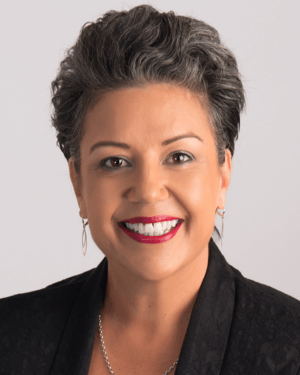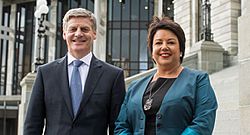Paula Bennett facts for kids
Quick facts for kids
Paula Bennett
|
|
|---|---|

Bennett in 2018
|
|
| 18th Deputy Prime Minister of New Zealand | |
| In office 12 December 2016 – 26 October 2017 |
|
| Prime Minister | Bill English |
| Governor-General | Patsy Reddy |
| Preceded by | Bill English |
| Succeeded by | Winston Peters |
| Deputy Leader of the Opposition | |
| In office 26 October 2017 – 22 May 2020 |
|
| Prime Minister | Jacinda Ardern |
| Leader | Bill English Simon Bridges |
| Preceded by | Kelvin Davis |
| Succeeded by | Nikki Kaye |
| Deputy Leader of the National Party | |
| In office 12 December 2016 – 22 May 2020 |
|
| Leader | Bill English Simon Bridges |
| Preceded by | Bill English |
| Succeeded by | Nikki Kaye |
| 18th Minister of State Services | |
| In office 8 October 2014 – 26 October 2017 |
|
| Prime Minister | John Key Bill English |
| Preceded by | Jonathan Coleman |
| Succeeded by | Chris Hipkins |
| 14th Minister for Women | |
| In office 20 December 2016 – 26 October 2017 |
|
| Prime Minister | Bill English |
| Preceded by | Louise Upston |
| Succeeded by | Julie Anne Genter |
| 35th Minister of Tourism | |
| In office 20 December 2016 – 26 October 2017 |
|
| Prime Minister | Bill English |
| Preceded by | John Key |
| Succeeded by | Kelvin Davis |
| 38th Minister of Police | |
| In office 20 December 2016 – 26 October 2017 |
|
| Prime Minister | Bill English |
| Preceded by | Judith Collins |
| Succeeded by | Stuart Nash |
| 5th Minister for Climate Change Issues | |
| In office 14 December 2015 – 26 October 2017 |
|
| Prime Minister | John Key Bill English |
| Preceded by | Tim Groser |
| Succeeded by | James Shaw |
| Member of the New Zealand Parliament for Waitakere |
|
| In office 8 December 2008 – 14 August 2014 |
|
| Preceded by | Lynne Pillay |
| Succeeded by | constituency abolished |
| Majority | 9 |
| Member of the New Zealand Parliament for Upper Harbour |
|
| In office 21 September 2014 – 17 October 2020 |
|
| Preceded by | constituency established |
| Succeeded by | Vanushi Walters |
| Majority | 9,692 |
| Personal details | |
| Born | 9 April 1969 Auckland, New Zealand |
| Political party | National Party |
| Spouse | Alan Philps |
| Children | 1 |
| Alma mater | Massey University (BA) |
| Occupation | Recruitment consultant |
Paula Lee Bennett (born 9 April 1969) is a New Zealand former politician. She served as the 18th Deputy Prime Minister of New Zealand from December 2016 to October 2017. She was also the deputy leader of the National Party from 2016 to 2020.
Bennett was a Member of Parliament (MP) for Upper Harbour from 2014 to 2020. Before that, she represented the Waitakere area. She held several important roles in the government, including Minister for Women and Minister of Police. She decided to retire from Parliament in 2020.
Contents
Early Life and Education
Paula Bennett was born on 9 April 1969 in Auckland, New Zealand. Her parents were Bob and Lee Bennett. She has Māori heritage through her grandmother, who was from the Tainui tribe.
When she was young, her father ran a flooring business. Later, in 1974, her family bought a village store near Taupō. Paula went to Taupo-nui-a-Tia College in Taupō. At 17, she had a daughter named Ana. She raised her daughter while working in hotels and tourism. Sometimes, she received government support to help her family.
In 1992, Paula moved to Auckland. She worked in a rest home, first in the kitchen, then as a nurse aide. In 1994, she started studying social work at Massey University. She became involved in student politics, serving as president of the student association in 1996. This experience made her interested in a career in politics. She earned a Bachelor of Arts degree.
After university, Bennett worked for Murray McCully, a National Party Member of Parliament. She was his electorate secretary until 1999. She then worked as a recruitment consultant for several years.
Political Journey
| New Zealand Parliament | ||||
| Years | Term | Electorate | List | Party |
| 2005–2008 | 48th | List | 45 | National |
| 2008–2011 | 49th | Waitakere | 41 | National |
| 2011–2014 | 50th | Waitakere | 14 | National |
| 2014–2017 | 51st | Upper Harbour | 9 | National |
| 2017–2020 | 52nd | Upper Harbour | 2 | National
|
Entering Parliament: 2005-2008
In the 2005 election, Paula Bennett ran for the National Party in the Waitakere area. She did not win the local seat, but she became a Member of Parliament through the party list system. This means she entered Parliament because of her party's overall votes. At this time, the National Party was not in charge of the government.
While in opposition, Bennett worked on issues related to welfare and early childhood education.
Government Roles: 2008-2017
In the 2008 election, Paula Bennett won the Waitakere seat. The National Party formed the government, and she was given several important roles.
She became the Minister of Social Development from 2008 to 2014. In this role, she worked on changes to the welfare system. She also served as Minister for Youth Affairs and Minister for Disability Issues.
Later, she became Minister of State Services, Minister of Social Housing, and Minister for Climate Change Issues.
Becoming Deputy Prime Minister
In December 2016, John Key stepped down as Prime Minister. Bill English took over, and Paula Bennett was chosen as his deputy. She became the Deputy Prime Minister on 12 December 2016. She also held roles as Minister for Women, Minister of Police, and Minister of Tourism.
In the 2017 election, Bennett won her seat in Upper Harbour again.
In Opposition: 2017-2020
After the 2017 election, the National Party did not have enough support to form the government. Paula Bennett continued as the National Party's deputy leader under Simon Bridges. She was a spokesperson for social services, women's issues, and drug reform.
In August 2019, Bennett announced she would not run for her local seat in the 2020 election. Instead, she planned to be a list-only candidate. She also managed the National Party's election campaign for 2020.
During the COVID-19 pandemic, she was part of a special committee that looked at the government's response.
In May 2020, there was a change in leadership within the National Party. Todd Muller became the new leader, and Nikki Kaye became the new deputy leader. Paula Bennett then announced that she would retire from politics at the general election in September 2020.
Life After Politics
After leaving Parliament in October 2020, Paula Bennett joined Bayleys Real Estate as a Director. In 2021, she hosted a TV show called Give Us a Clue.
In 2024, she was appointed as the chair of Pharmac, an organization that decides which medicines are funded in New Zealand.
Personal Life
Paula Bennett married Alan Philps in 2012. She has one daughter, Ana, and a granddaughter. She also has a stepdaughter.
In late 2017, Bennett shared that she had surgery for weight loss. By November 2018, she had lost 50 kilograms.
 | George Robert Carruthers |
 | Patricia Bath |
 | Jan Ernst Matzeliger |
 | Alexander Miles |


